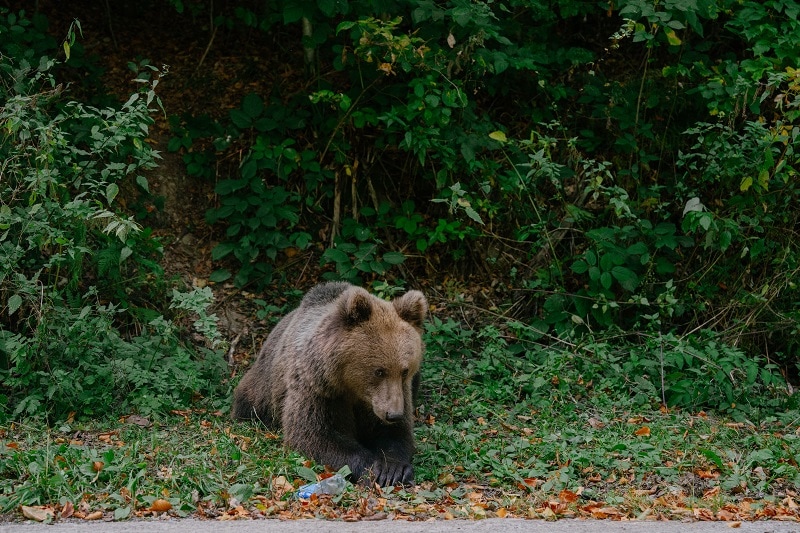As bear attacks become a bigger problem in Romania, home to Europe’s largest brown bear population, that country’s government has given permission for more bears to be culled this year. This increase is from 50% to 220%.
More and more bears are leaving the forests in search of food – which they often find from tourists or in rubbish bins.
Motorists in central Romania were recently left speechless when they came across a brown bear on a winding forest road. It looked like the bear was sleeping or dead, with its head on its paws and a few paper napkins next to it.
But the bear only took a break after consuming a sandwich; one of many that tourists threw at him so they could take a picture of the bear.
On the one hand, farmers and herdsmen are concerned about the bears taking their livestock and on the other hand, conservationists are concerned about the bears’ well-being and are opposed to even more bears being killed.
Those pushing for more bears to be culled say the bears are a threat to humans and claim their numbers are increasing, with the Department of Environmental Affairs estimating the bear population at 8,000.
Conservationists argue that the human-bear conflict should be better managed rather than killing the animals.
Experts are also concerned that outdated, inaccurate methods may be used to count the species. The animals are protected in terms of an EU directive to ensure their conservation.
The results of a census that uses DNA to ensure that the same stray bear is not counted several times are not yet available.
Bears on the street ‘not romantic at all’

Several local residents of the Carpathian mountain range say they are concerned about the increase in the number of bears.
According to official statistics, 14 people were killed and 158 injured in bear attacks between 2016 and 2021.
Tibor Fekete, a shepherd who takes care of 70 cows in mountain pastures in the vicinity of the Santa Anna lake, asks that the bears be shot. He says they caught three of his cows this year.
“Bears cause damage and endanger our lives,” said 40-year-old Fekete, who complained about the expense of keeping six dogs to protect his livestock.
Last month, a bear entered a school grounds in Miercurea Ciuc, 30 km away, and climbed into a tree there. An intervention team killed the animal rather than chasing it away and said they wanted to ensure the safety of the school’s approximately 1,700 learners.
Bears can still attack even after being shot with an anesthetic, says Miercurea Ciuc’s mayor, Attila Korodi. He says more bears have been chased off the town’s streets this year than last year.
“Daily life with the bears in our streets is not a romantic picture at all,” says Korodi.
Trophy hunting of bears has been banned in Romania since 2016 and only “specialized technical personnel” are allowed to shoot the animals.
Lawmakers, led by Barna Tanczos, until recently the minister of environmental affairs, tabled a bill to allow the killing of nearly 500 bears a year.
Otherwise, bears will end up roaming the lowland areas, such as the capital Bucharest, claims Tanczos.
His claims are disputed by conservationists who fear that the increasing killing of bears could open the door to trophy hunting. They say that as a result, bears that cause no trouble are then shot.
‘Bear-smart’ community
Not far from Miercurea Ciuc, the small tourist mountain town of Baile Tusnad wants to become a so-called bear-smart community.
“We have to understand that bears will not disappear from this area. But if the bear doesn’t feel safe, it doesn’t stay in the town,” said 36-year-old biologist Istvan Imecs.
This town is full of tourists, foreigners and Romanians, who like to feed bears even if it is illegal.
With advice from Imecs and conservation groups such as the World Wildlife Fund (WWF), the town is testing “bear-friendly” rubbish bins and around 400 electric fences have already been installed around houses and rubbish bins.
There is also an app that explains what to do to avoid conflict with the animals.
Of 50 property damage complaints filed in 2021, the town had no complaints in 2022 and 2023.
Laci, a resident who only gave his first name, already installed an electric fence years ago.
“Anyone in Tusnad who says he is not afraid of bears is either a liar or stupid,” said 47-year-old Laci.
“We just got used to living with the bears in the same town. There is no other way out.”








